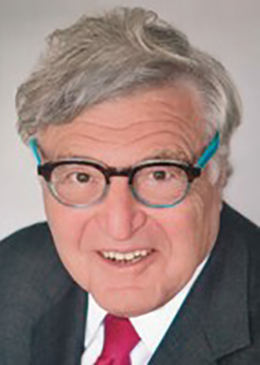Robert Del Tufo

Robert Del Tufo was born on November 18, 1933, to Raymond and Mary Del Tufo, both immigrants from Italy. He graduated from the Newark Academy and received a bachelor of arts from Princeton University in 1955, then an LLB degree from Yale Law School in 1958.
Like so many of his generation, he was greatly influenced by the political volatility of the 1960s, and was particularly affected by the abuse of power he observed in local and state government at the time. The result was a heightened sensitivity to injustice, particularly racial injustice, as well as an unwavering intolerance for political corruption of any kind.
Del Tufo's career began as assistant county prosecutor in Morris County (1963–1965) and first assistant prosecutor (1965–1967). He maintained a private practice in Morristown until becoming first assistant attorney general in the Byrne administration in 1974. "Even then," says former New Jersey Supreme Court Chief Justice James Zazzali, "you could see his moral courage and sometimes his sense of outrage." In that position, Del Tufo resisted pressure to relax bidding requirements related to the New Jersey Sports and Exhibition Authority because he realized it could open the door to future abuses—an unpopular, but laudable position. He "brought the maximum of integrity and competence and character to the task. I'm not overstating it," says Zazzali. "He was unflinching."
In 1977, Del Tufo was nominated for U.S. Attorney for the district of New Jersey by President Jimmy Carter, a position he held until 1980. He prosecuted several high profile cases in that position and remained characteristically unafraid to go against the grain when his principles required it. When ABSCAM—a sting operation in which politicians were videotaped taking bribes from an Arabian company that was actually an FBI front—came before him, he refused to proceed with the case, taking the position that the FBI engaged in entrapment. (On tape, the senator first said, "No, no, no, no," when an agent posing as a sheikh offered him a bribe—a claim Mr. Williams echoed in his unsuccessful appeals.) After convictions were handed down by a New York judge, Del Tufo was quoted as stating that judge had "a warped view of the prosecutor's role in detecting and prosecuting crime."
Del Tufo returned to private practice in Newark (1980–1986), during which time he made an unsuccessful bid for the Democratic nomination for governor of New Jersey in 1985. In 1990, then-Governor James Florio asked him to serve as attorney general, stating, with respect to Del Tufo's integrity in general and ABSCAM in particular, "It takes a person of principle to stand up, and Bob Del Tufo stood up."
During his time as attorney general, Del Tufo was credited with aggressively prosecuting environmental violations and spearheading the Office of Bias and Community Relations, a newly-created statewide agency to combat hate crimes. He was also credited with reducing complaints about racial profiling and improving relations with minority communities in New Jersey by forging relationships with the NAACP, the ACLU, and minority advocacy groups.
When Del Tufo returned to private practice, with the New York City firm of Skadden, Arps, Slate, Meagher & Flom, he was appointed chairman of the board of trustees of the University of Medicine and Dentistry of New Jersey by then-Governor Jon Corzine—a position that was critical to rebuilding trust and confidence in the program. Del Tufo managed that responsibility as he did every other—with commitment, integrity, and professionalism, with no fanfare or expectation of personal reward.
Over three decades, Del Tufo served on the board of trustees for Legal Services of New Jersey, 1986 to 2016, stepping down only during his term as attorney general, to avoid a conflict of interest. He was committed to the cause of equal justice and unwavering in his support of the institution of Legal Services in New Jersey. In the words of U.S. District Judge Anne Thompson, a close personal friend, "Bob was a giant of our justice system and Legal Services will always be richer because he embraced its causes."